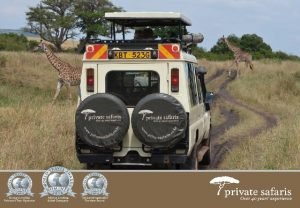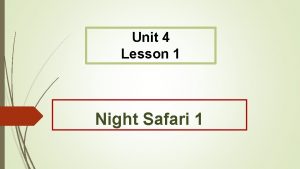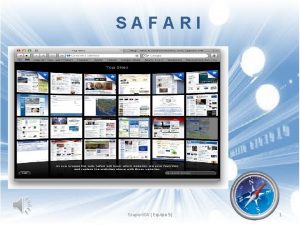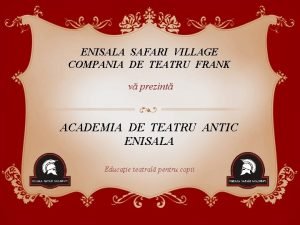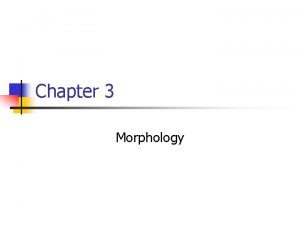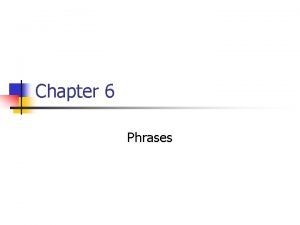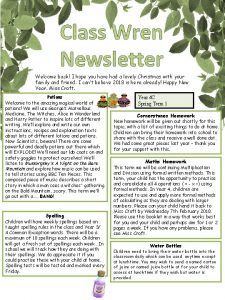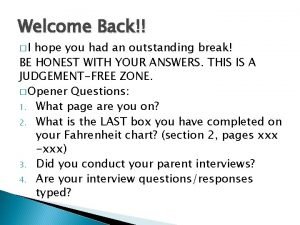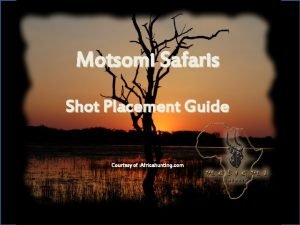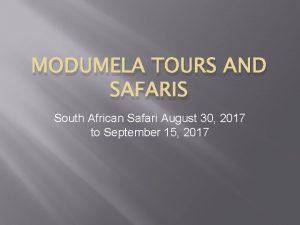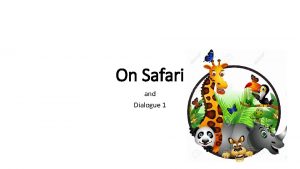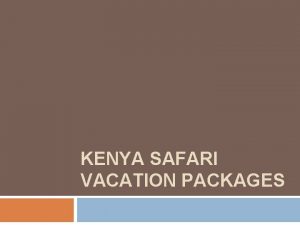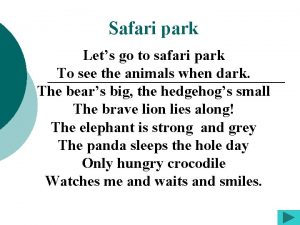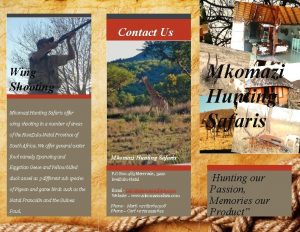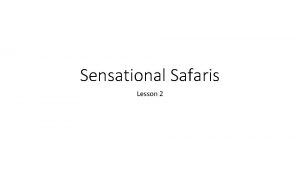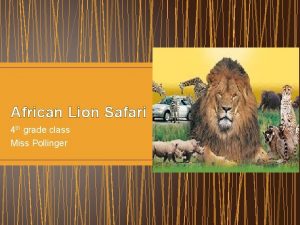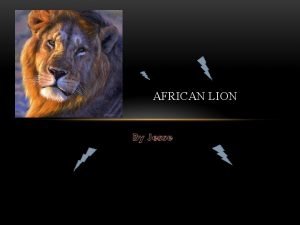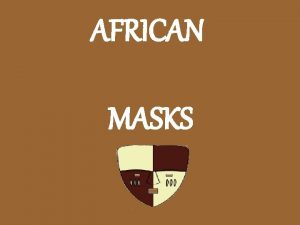Motsomi Safaris Planning your African Safari Welcome to



























- Slides: 27

Motsomi Safaris Planning your African Safari ?

Welcome to your dream Safari! Safari Planning We hope this planning guide will help you maximize your dream safari. It’s full of tips and helpful hints to allow you to get the most out of your trip. The Motsomi Professional Hunters (PH’s) are highly qualified, experienced and technically competent with the advice they offer for tough African game, hunting methods, equipment limitations that have been tested and proven in the field, as well as legislation introduced by the government ensuring the ethics of the sport is upheld. Motsomi is proud that they have carefully selected exclusive areas to ensure maximum success and quality of trophies on their hunts. Strict zoning policies and area usage ensure rifle hunting is excluded in preference to the bow hunting option. A combination of the above factors and the expertise of renowned Professional Hunters will ensure the hunter an unforgettable safari of a lifetime Motsomi Safaris Pieter and Ria Potgieter http: //www. motsomi. com You’ll come as a Client and leave as a Friend!

Index • • • Safari Planning Costs Travel Fire Arms Safari Gear Personal Gear Health Hints Other information Rifle, Handgun & Black Powder Hunting Bow Hunting Game Identification and Shot Placement Some thoughts on African hunt expectations Getting your trophies home Please feel free to ask us anything else you don’t have clarity on. Motsomi Safaris Tel: 01127 84 263 6197 / +27 83 4040 111 Fax: 01127 866 138 799 Pieter Cell: +27 83 442 0578 E-mail: info@motsomi. com / ria@motsomi. com

Cost: General Budget Planning - General Costs of a Safari Hunting: Day Fees and Trophy costs, tips, side trips, curios & gifts. Travel: Air travel to South Africa Taxidermy and Shipping As you plan your safari, keep in mind that with Motsomi Safaris, your cost of your safari is spread out over time, sometimes several years. For example, when you book your safari, you pay a percentage of your hunt cost, usually about 50% of the day fees to hold your dates. You pay nothing else to Motsomi until the last day of your safari when you settle and pay your bill. In the meantime, you book your airfare and pay for it. Then, after you hunt, you pay for taxidermy and Shipping which is also spread out over about 10 months. So you will agree that hunting in Africa is affordable.

Cost: Hunting You can choose between the following: Hunting Packages: Special packages are always a good start for the first or second African Safari. They include day fees and a set choice of animals to hunt, but some animals can be substituted by prior arrangement, as well as all permit fees and taxes. There a variety of packages that fit all needs. If you would like to hunt additional animals, you can just add them to your hunt from the price list. For example: You choose the Kukama special which include the following animals: Blesbuck, 1 Blue or Black Wildebeest, Impala, Warthog and 1 Zebra/Red Hartebeest/or Gemsbuck. If you would like to hunt a Kudu, then you can just add it to your package. Your cost would be the Kukama amount plus the Kudu amount on the price list. Your day fees are already included unless you would like to stay longer. Animals from price list: This is usually for returning safaris. You already shot most of the animals on the packages and would like to shoot specific animals. Here you need to decide how long you would like to hunt and then decide on your animals you would like to hunt. For example: Choose the number of days of your trip @ daily rate plus the different animals you want to hunt from the price list. Depending on what you choose to hunt, you may have to travel to different areas, which takes extra time. Keep this in mind during your planning. There is Value added tax to be paid on day fees. Big Game: Big game packages usually include the trophy fee and a minimum amount of hunting days. Adding additional animals needs to be discussed with the PH during your planning. You may need to add extra days to your hunt to harvest extra animals. For example: Buffalo hunting requires a minimum of 7 days. If you finish early you might have time to take more animals, but to be guaranteed time to hunt other animals, you should add extra days to your safari. Please refer to your Brochure for different prices or click on the links below: SPECIALS http: //www. motsomi. com/specials. php PRICE LIST http: //www. motsomi. com/pricelist. php

Cost: Non –Hunting Activities You may want to plan excursions for the non-hunters in your group, or for yourself after your hunt. Sightseeing You may want to add on days to travel to other areas of South Africa, such as Kruger , Cape Town or Victoria Falls. This can easily be arranged and should be discussed when planning and booking your safari. Examples of non-hunting trips can be found at: http: //www. motsomi. com/Photographical_Safaris. php Shopping You will have an opportunity to go curio shopping, probably on the way to the airport at the end of your safari. If you have specific interests, please discuss these when planning your hunt. Other costs - Tips Please review this guide, but feel free to ask us questions: http: //www. motsomi. com/docs/Tipping%20 Guide. pdf

Travel VISAS US citizens do not need a VISA for SA. Your Passport must be valid 6 months beyond intended stay, and contain two blank visa pages. Visas to Mozambique can be obtained at the border post upon entry. Check details if you are traveling to other countries.

There are 54 international airlines serving South Africa. Many of these provide service to and from North America and South Africa. Those that have direct flights from the US to South Africa are the best to use if you are bringing firearms. They include Delta (from Atlanta) and South African Airways (from Washington Dulles and New York). They may run on a code share basis with other airlines. We do NOT recommend transporting firearms through any other country on your way to South Africa is also considered the gateway to Africa, with flights between here and ports of call throughout the rest of the continent on a daily basis, with several African airlines, including South African Airways. Check directly with the airlines of your choice or a travel website to determine your best way to travel and the best price. Prices of airline tickets vary depending on the season you are traveling. NOTE: customs allowances can change at any time, so check with customs or your airlines for current information.

Fire Arms and Bows Rifle and ammunition: • A. 30 caliber is normally a good all-rounder for plains game and the minimum for hunting the big 5 is a. 375. • Bring enough ammunition with; especially if you have a caliber for which ammo isn’t readily available. Bring at least 5 rounds per animal that you intend to hunt + 1 box extra, your rifle might need to be sighted in. • Due to the toughness of African animals only the best premium bullets must be used such as Barnes TSX. Bow and arrows: • Depending on the size of the animal but 50 - 70 pond bows will normally be adequate with enough heavy arrows with at least 100 grain or heavier broad heads with 2 to 4 fixed blades. Remember your release, a spare string & release and judo heads or similar for bird hunting. • According to Nature Conservation the following is recommended kinetic energy: - Impala 45 ft / lb energy - Kudu 60 ft / lb energy - Blue wildebeest 70 ft /lb energy. (If you are close to this you will be fine) • The formula to calculate Kinetic energy is: (Arrow speed)² X Total arrow weight / 450240 = ft / lb energy. • Crossbows are allowed.

Fire Arms Importation of Firearms - Temporary Firearm Import Application – SAP 520 is REQUIRED No permit is needed for a Bow. You have 2 options: • One: Do all the paper work yourself, which we will supply to you. • Two: Strongly Recommended: You can obtain the required Firearms Importation Permit from PHASA – Professional Hunters Association of South Africa at a minimal fee of about $140. Privileges of doing so: 1. No long lines at the airport which could be up to 4 hours. 2. You know before hand that all your documentation is in order. 3. If your Rifle does not arrive on the same flight with you; you do not need to drive back from the hunting area and loose a day or 2 of hunting to sign for it when it does arrive. It will be delivered to you where ever you are hunting within SA. You can contact them at phasa@pixie. co. za or website www. phasa. co. za

The following is applicable for the importation of your Firearm/s, no matter what option you go for: For the Temporary Firearm Import Application – SAP 520, click on the link below: http: //www. motsomi. com/docs/Firearms. SAP 520. pdf This must be completed before arrival in South Africa. This is recommended if possible to help streamline the entry process. If you apply for the permit before arrival the SAP 520 and all supporting documentation must be send to PHASA at least 25 days before arrival in South Africa. Instructions for completing the SAP 520 Form: • Black ink must be used to fill in the form. • Please note that not all sections of the form apply. Visitors bringing their own firearms in for hunting purposes should fill in the following: • Page 2 Section D: 5, Section E: 1 – 25. 4 Natural person’s details • Page 4 Section G: 1 – 5 & 8 – 9. 2 Import/Export details • Page 5 & 6 Section I SIGN 4. 3 Details of Firearms, ammunition, etc. • Page 6 Section J SIGN 3

Required to be submitted with the SAP 520 will be the following: Copy of your Passport (photo and signature pages) Copy of return Airline Ticket Proof of Ownership This is usually US Custom Declaration Form 4457 (officially stamped). It can be obtained from your closest custom agent such as at a small airport. NOTE: Be sure to confirm that the serial number on your firearm matches the serial number on the 4457. Proof of Export Again, US Custom Declaration Form 4457 (officially stamped) will show documentary proof of export from the country of origin. NOTE: You will need the 4457 to bring your firearm back into the US after your safari. Invitation Letter from Motsomi (Hunting outfitter) The letter will state the following: Company name and details, name of your outfitter & his registration nr, ph’s registration nr as well as addresses and contact telephone numbers in South Africa of where you will be staying / hunting during the course of your hunt and confirmation that the applicant will be using the specific firearms as applied. This information is necessary for the actual Temporary Import Permit, as well as if the police need to be in contact for any reason. Please supply Motsomi with the relevant rifle information for us to send you this letter.

Allowances and Specifications • Maximum of 4 firearms, but no more than one firearm per caliber and 200 rounds of ammunition per firearm will be allowed into the country per client. The only exception to this is for shotguns, where more than one shotgun of the same caliber may be allowed for bird hunting purposes if the client produces on arrival at the South African Police Gun Office an acceptable written motivation as to why he/she requires more than one shotgun of the same caliber. • Permits will only be issued for ammunition which is accompanied by a firearm of the same caliber. • Check with your airline carrier as to how ammunition should be packed. Ammunition must be in a hard box (preferably that can be locked). Declare it when you check in for your departure. • Temporary Import Permits will not be issued for anyone under the age of 21. • Firearms that may NOT be imported are: (Section 32 of the Arms and Ammunition Act, 1969) (Act NO. 75 of 1969) Automatic Rifles Semi-automatic rifles Automatic or Semi-automatic Shotguns Handguns for self-defense Weapons that fall under military categories • Strict controls on automatic and semi-automatic firearms are enforced. This will affect clients wanting to bring in semi-automatic shotguns on temporary import permits. The latest requirement which is in effect that no temporary import permit will be issued for a semi-automatic shotgun unless an application is made in 21 days in advance together with a motivational letter as to why the shotgun is needed. The application must be made through the Central Firearms Registry. • Handguns will only be allowed for hunting purposes and must be accompanied by a letter from an association in the country of origin, stating that the handgun will be used for hunting purposes as well as from us, your outfitter. Please check the PHASA Website at www. phasa. co. za for any updates to this information.

What to do at Johannesburg International Airport: • Clear passport control in the arriving terminal. • Go to the Import/Export Office. Next to it is an area marked: ”Firearms and Security Items”. Here you will identify your rifle case and sign for it, if required. You will not receive it yet. NOTE: If you have a bow case, it may be there as well. Or it may come through with regular luggage. • Proceed to baggage claim at the respective carousel. Pick up general baggage, and then proceed to the GREEN line at Customs. Finish any other custom clearance procedures. • Proceed to the arriving terminal from where you go to the South African Police Firearms Office (SAP), where one of Motsomi’s representatives will meet you. For passengers arriving in Terminal A 1 or A 2 exit the arrival hall and turn right, look out for the SAP office. • Here you will receive your Importation Permit. If you applied for a Pre-approved Permit from PHASA, their representative will meet you with all your documentation that you need to clear your rifle. If not a Motsomi representative will be with you to help you through the process. • Your firearm(s) and ammo will be checked against your temporary import permit after which you will be free to leave. For a bigger picture please click on link below: http: //www. acsa. co. za/home. asp? pid=6974

Safari Gear Laundry is done on a daily basis, so there is no need to bring extra hunting clothes. The following is just an indication and not a complete list: • Warm jacket • 3 sets of hunting clothes, preferable zip off pants in case it’s hot. Bring COMFORTABLE clothes that you can layer since it can be cold in the mornings and evenings while quite warm during the day. • Quality socks that have been worn with your boots. • Boots that have been broken in and are comfortable. You may be walking in a thorny area, so be sure the soles can withstand thorn punctures. • Gaiters to keep grass and seeds out of shoes (optional also available at Motsomi Curio Shop) • Long underwear (or silks) if you are coming in mid-winter. • Relaxing clothes and shoes for the evening. Casual clothes for possible sightseeing. • Swimsuit – for certain times of the year. • Something to read or to do during the day or when sitting in a blind.

Hunting Colours Muted colours like khaki, olive, green and brown work great, as well as camouflage in the same tones. No light khaki or beige for the bush. No ‘hunter orange’ or luminous warning badges or stripes are required. Natural Fibre vs. synthetic Safari clothes made of natural fibres like cotton are far more comfortable for sweating and quiet when you are walking. There is the trend now to wear synthetic clothing. Synthetic clothing does not hold up in the thorny bush and can be noisy to walk in. In addition, your clothing may return from the laundry with a melted hole in them if you had not warned the ironing person. Wear and Tear on clothing Don’t bring clothing that is too good to get torn by thorns, get permanently stained with mud, blood and other natural bush ‘ stains’ or undergoes subtle and not so subtle colour changes due to the sun. Permethrin If you are susceptible to insect bites, consider treating your clothes with Permethrin to reduce insect bites. You can do this yourself with the many Permethrin products available or buy ready-impregnated clothes from manufacturers like ‘Buzz Off’. NOTE: Winter months have hardly any insects.

Personal Gear Suggested items to bring: - Personal medicine - Bring extra prescription medicine that may be needed. Be sure to place it in your carry on. - Extra glasses. If you wear prescription eye glasses, be sure to bring an extra pair. - Toiletries - Sunglasses - Sunscreen - Camera with extra memory sticks and extra batteries - Video camera with enough tapes/cd’s (Not a necessity) - Binoculars - Range finder (Not a necessity) - Flashlight - Insect Repellant - Other hunting accessories you feel you will need - Hair dryers are supplied in rooms as well as soap, shampoo, lotion and toothpaste. Towels are supplied and washed daily.

Health Hints Get fit! Get your body in condition for the rigors of an African buffalo and elephant hunt. Pay attention to small details like getting the correctly fitting socks and boots. Vaccinations or inoculations No special vaccinations are required coming into South Africa. Check with your physician, they may suggest a tetanus shot. However, if you plan to travel to other African countries, check requirements before leaving home. Malaria Motsomi’s main hunting areas are in a Malaria Free area. However, if you expect to travel in a malaria prevalent area, such as Mozambique, precautions are advised. Malarone is a good . choice but consult with your physician. Drinking Water Tap water is safe throughout most of the country, but Motsomi Safaris always offers bottled water to clients. Illness or Injury Check with your health insurance before you travel. You will be hunting in remote areas. Consider subscribing to something like Global Rescue. They will evacuate you from where you are and take you to the nearest facility to stabilize before taking you back to the states. For more info on this plan visit www. globalrescue. com. Motsomi Safaris subscribes to Global Rescue for their own employees.

Other information Electricity The current is 220/240 volts. Check if your appliances are compliant with 220 V. If not, you will need a transformer. Otherwise, you will need an adapter plugs that we can provide. Currency The South African currency is the Rand. It is divided into cents. It is advisable, as it is anywhere in the world, to use traveler's checks and not to carry too large amounts of cash. Unless you are travelling on your own, you will only need Rand for curios or gifts. You can exchange your US dollars for SA Rand at the airport. Major credit cards are accepted at most larger shops or establishments. ATMs (Automatic Teller machines) are virtually everywhere for credit card use. Remember that the South African Rand is a fairly volatile currency and the exchange rate tends to change on a daily basis. Motsomi Safaris accepts traveler's & personal checks(by specific arrangement), cash, bank drafts and credit cards as payment. Please confirm type of payment prior to trip. Safety Crime and security in South Africa are much debated both locally and by the international media. Motsomi will not take you to any hot spots and out in the bush there is virtually no crime at all. Insurance Travel insurance is always a good idea, for yourself and your belongings, as well as for delays and cancellations and other unexpected situations. Medical insurance is also a good idea, particularly if you are going to be in remote bush areas.

Communicating with family and friends in the US Phone cards can be purchased for international calls. Cellular telephones may be rented at major airports and at other outlets. Cellular coverage is not always available in the hunting areas. Satellite telephones are also available for rent. South Africa’s international code is 01127 and for mobile phones just 27. To call out of the country precede all numbers with 001. Depending on where you hunt, you will also have access to internet service. Confirm this with Motsomi prior to your hunt. Motsomi will always have some kind of communication available in case of an emergency. Climate Africa has a wide range of climate zones, although generally it may be considered to have a moderate climate. Chilly mornings, warm/sunny days and cool evenings are normal with a possibility of rain but very unlikely. Hunting is mostly done during the winter months from April to October, so you´ll be dealing with temperatures between 10°C/50°F and 32°C/100°F. Food and Drink Your safari is designed with you in mind! When signing up for the safari, you will be asked to provide your food and drink likes, dislikes, allergies, and special requests. Catering can be done for specific dietary requirements. The mornings are greeted with a traditional African brunch whilst the long, hot days are ended with a delicious African feast. Evenings are spent around a large log fire, with the roar of the wild in the distance many memories of a good days hunt are both shared and enjoyed by all.

Rifle , Handgun or Black Powder Hunting Assume you have skills in the fundamentals of shooting – distance, aiming, trigger squeeze, breath control and follow through. So what is going to be different for a hunt in Africa? Your new rifle Lots of hunters buy a new rifle for hunting in Africa, often a larger calibre rifle specifically for dangerous game. For some hunting clients, the first time they shoot that rifle is at the sighting-in range in the hunt area – in Africa. Time and opportunity are pressing factors for everyone, but a hunter intent on having a successful African hunt must get really familiar with the rifle(s) he is going to use. Try to go to a range to get a feel for your firearm. Get to know your rifle like a woman knows her handbag. If it is a new high calibre rifle learn not to be afraid of it and the recoil. Shooting Positions Include lots of different positions in your shooting practise, like sitting and kneeling, making use of trees or anything else you can find for a rest – just get away from the bench. Practice shooting offhand too, though this can sometimes be difficult to master. Practise at Home If you don’t get the time or opportunity to go to the range then practise at home. Try dry firing, getting into various positions, using sticks, using the sling etc.

Do your Homework There is a lot to be said for getting your mind “in practice” for the hunt – start studying the animals you want, visualising shot placement and believing you will be successful. Shooting Sticks Shooting sticks are commonly used in Africa and you would not believe how these can baffle a hunter who is not used to them. Sticks are mainly tripods but can also be a bipod on your hunt. Make Shooting Automatic Practise shooting quickly. Try to train yourself to make quick and sure shooting decisions, judging angles through sometimes thick cover. Hunting with a Professional Hunter(PH) Most important. . Trust your PH! Hunting in Africa is different than going off on your own in the US. Your PH will guide you in positioning and shot placement. Listen and learn.

Bow Hunting The best months to bow hunt are the dry winter months July to Oct. They are usually conducted in three ways: Blinds Most hunting will be conducted from permanently constructed blinds. These are situated approximately 20 yards from waterholes and salt licks. Some blinds are elevated from the ground, and others are ground blinds, depending on the terrain, sun and wind direction. These blinds are spacious and have roofs overhead. Shooting ports are adjustable to suit both standing and sitting archers. Stalking This method is used for the “more difficult” species or those that do not frequent waterholes. Some concessions offer the ideal terrain for this method. In April, May and June, thick vegetation makes it possible to get within bow range. Opportunity This includes a variety of hunting methods. The most commonly used is locating animals while cruising in a 4 x 4 vehicle. A large area can be covered using this method without losing valuable time walking through dead terrain. Once game has been sighted the stalk is planned and the vehicle drives off leaving the hunter and his guide in a suitable position. A hunter can also select an active game trail used by a specific trophy and erect a tree stand or temporary blind.

Game Identification and Shot Placement Shot placement is a key element in hunting African animals. It is different than most North American animals. Study shot placement for the animals you want to hunt. If you miss the vitals (heart/lung), you are standing the risk of loosing your animal. Follow this link to access the Shot Placement Guide on our Website: http: //www. motsomi. com/shotplacements. ppsx

African Hunt Expectations As with any hunting experience, you need to have realistic expectations. Be sure you communicate your expectations to us during the planning stage of your safari and to your PH. You will get out of the experience what you put into it. Shot Opportunity Motsomi will provide an opportunity to shoot specified species for a client who is assumed to be a reasonable shot and reasonably capable of getting themselves around. The hunter must be fully prepared for the hunt (physically fit, proficient with your rifle, comfortable boots, etc). Missing or Wounding an Animal You pay for every animal dead or wounded, even though you might not have it. Please keep this in mind and discuss it with your PH before you keep shooting at animals and want only to pay for the dead ones.

Viewing Game Animals If you want to have a game viewing trip, we will help you plan a trip to one of the many game parks. When hunting, remember you are hunting in the wilderness, and may not see animals around every corner. Animals are free to move around in hunting concessions And may require you to work hard for quality and success. Unforeseen Circumstances - Be Flexible A hunter in Africa should understand from the outset that there are events that are genuinely beyond an outfitter’s control. Motsomi strives to provide you with the best experience possible. For example, if it rains during a bow hunt, animals will no longer need to come to a waterhole. It is possible that your PH will move you to another location, or offer rifle hunting. But be sure that we will do everything possible to ensure your success and satisfaction. What makes a Memorable Hunt? It is more than shooting animals, it is the entire experience. It is the sights, sounds, and smells of the African Bush, the camaraderie around the campfire, the hard hunts, and the successes. It is the little things like seeing a dung beetle, watching a giraffe drink water, or watching a brilliant sunset. You are creating memories of a life time.

Getting your Trophies home Your trophies will be fully skinned and salted after every hunt. You need to decide if you would like your trophies done in South Africa by a South African Taxidermist or if you would like them to be shipped to the States and be done there. Who you would like to use is entirely your decision. We work closely with the following companies: Taxidermist –Nylstroom Taxidermy – Talk to Paul. Turn around time for your trophies will be anything from 9 – 12 months. Please visit link below if you would like more info from them. http: //www. nyltaxidermy. com/index. htm Dip and Pack –Swift Dip – Talk to Natasha. They will prepare your raw but dried trophies for export and will send it to you within 3 months. Please visit link below if you would like more info from them. http: //www. swiftdip. com/ Shipping Companies – We use SBS Logistics or Safari Cargo. They will ship out your trophies by air or sea what ever you decide, to a destination of your choice. Please visit the links below for more info. http: //www. sbslogistics. co. za/ http: //www. safaricargo. co. za/
 Motsomi safaris
Motsomi safaris Private safaris east africa
Private safaris east africa Henry mintzberg strategy safari
Henry mintzberg strategy safari Prescione
Prescione On safari lesson 1
On safari lesson 1 Eckels travels with time safari because he wants to
Eckels travels with time safari because he wants to Science safari water cycle
Science safari water cycle Safari 604
Safari 604 Modelul safari teatru
Modelul safari teatru Abcd safari
Abcd safari Safari bluetooth
Safari bluetooth Grammar safari
Grammar safari Safari ngorongorokrateret
Safari ngorongorokrateret African institute for economic development and planning
African institute for economic development and planning Welcome welcome this is our christmas story
Welcome welcome this is our christmas story Give us your hungry your tired your poor
Give us your hungry your tired your poor Welcome back i hope you had a wonderful holiday
Welcome back i hope you had a wonderful holiday Hello welcome to my class
Hello welcome to my class Welcome to english class
Welcome to english class Running shore
Running shore Welcome so glad you are here
Welcome so glad you are here Welcome back i hope you enjoyed your vacation
Welcome back i hope you enjoyed your vacation Welcome home we missed you
Welcome home we missed you I hope you enjoyed your trip
I hope you enjoyed your trip A letter to exchange student
A letter to exchange student Welcome to your senior year of high school
Welcome to your senior year of high school Welcome back hope you are feeling better
Welcome back hope you are feeling better Is faber a round or flat character
Is faber a round or flat character

